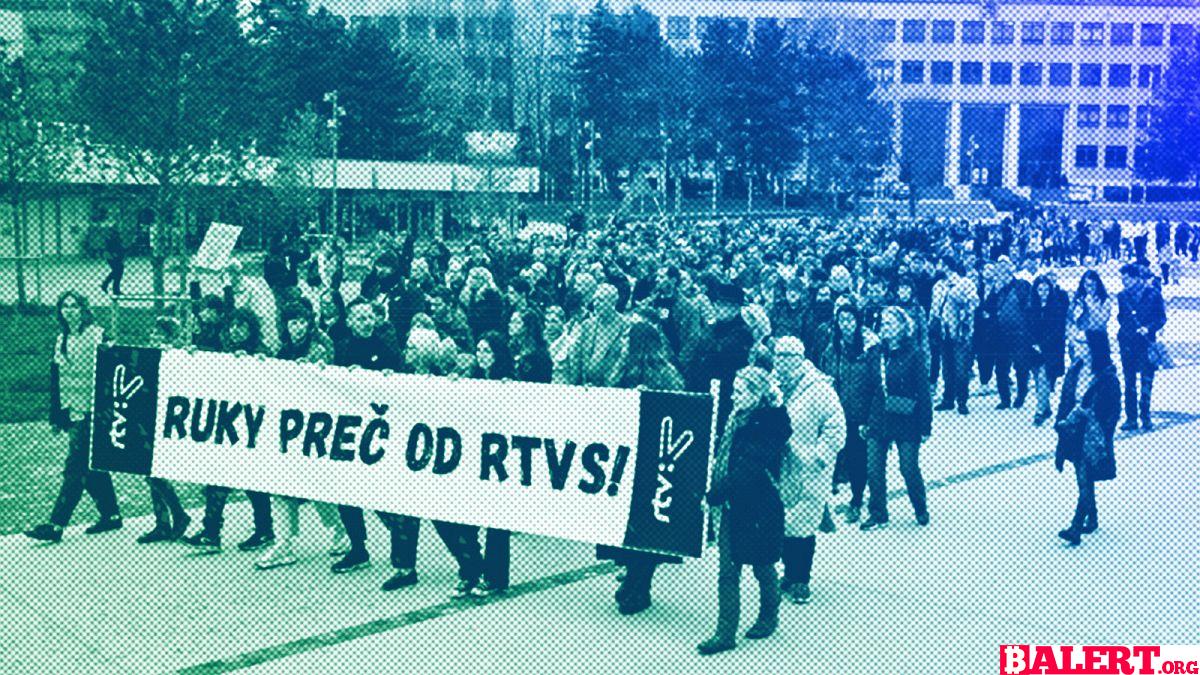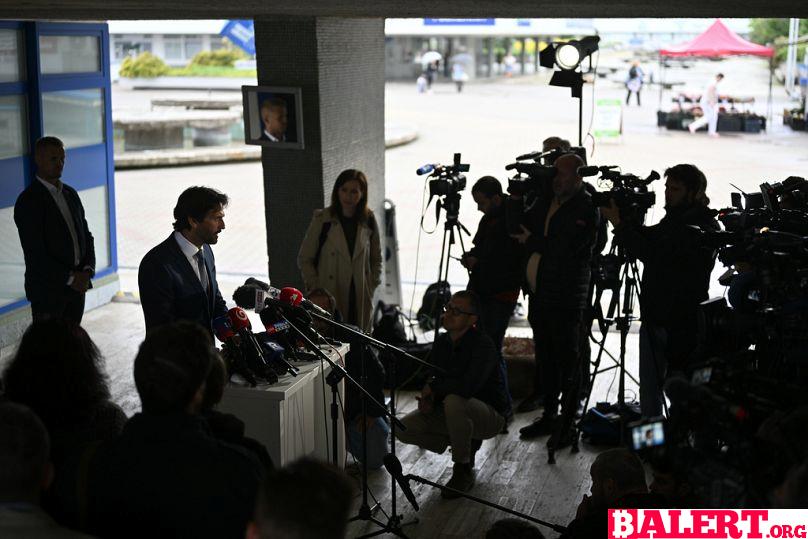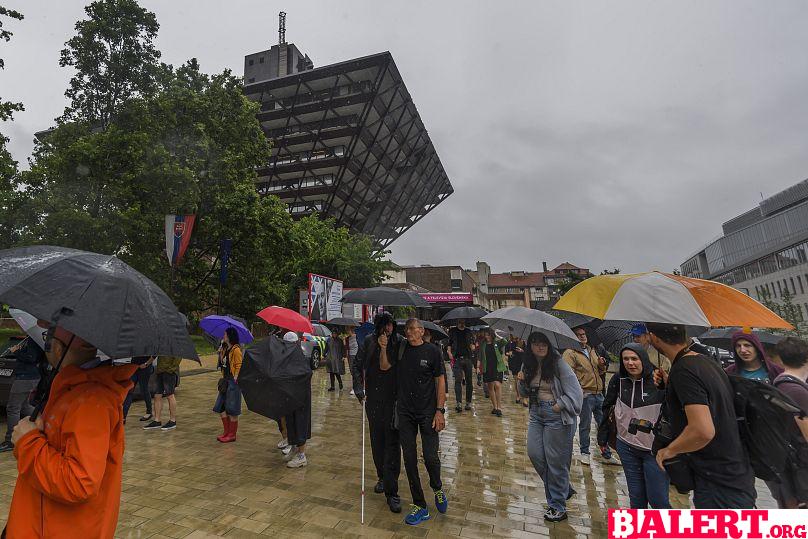World
The Threat to Press Freedom in Slovakia
Explore the challenges and dangers faced by the press in Slovakia, as threats to press freedom continue to escalate. Learn about the implications for journalism and democracy in this critical analysis.

On 15 May, the shocking news of the shooting of Slovak Prime Minister Robert Fico sent waves of uncertainty through Bratislava. As the details unfolded, it became evident how crucial a diverse and robust local media is in times of crisis. However, in the face of a growing threat to press freedom, independent reporters in Slovakia are now being targeted by the authorities.
During a visit to Bratislava on that fateful day, Attila Mong, a Hungarian journalist and the Committee to Protect Journalists (CPJ) Europe representative, and I explored the escalating danger posed to the press in Slovakia. The recently elected coalition government in Slovakia has displayed a concerning hostility towards the media, drawing parallels to Hungary’s media control under Prime Minister Viktor Orbán.
Attila, having experienced firsthand Hungary’s media takeover in 2010, noted the failure of interventions from Brussels. The worrying trend of biased news coverage favoring the ruling party in Hungary’s recent elections underscores the risk Slovakia now faces, urging the EU to act swiftly.
The Organization for Security and Co-operation in Europe (OSCE) highlighted the lack of a level playing field in Hungary’s 2022 elections, emphasizing the prevalence of biased media coverage that benefitted the ruling party. This scenario looms over Slovakia, warranting immediate action from the EU to prevent a similar erosion of press freedom.
The Menace of Media Restrictions

Recent legislative moves in Slovakia, including the establishment of a new public service broadcaster with potential political influence and the rapid introduction of media-related laws, signal a concerning shift towards press control. Traditional media outlets are facing dwindling trust, paving the way for social media-driven disinformation and conspiracy theories.
In the aftermath of Prime Minister Fico’s shooting, authorities in Slovakia resorted to blaming journalists for spreading hatred, creating a climate of fear and uncertainty among the journalistic community. Incremental attempts to undermine independent media are on the rise, with journalists facing pressure and verbal attacks from politicians.
A toxic discourse has permeated the Slovak media landscape, posing a significant threat to press freedom. The EU’s response to Hungary’s media capture serves as a cautionary tale, highlighting the need for proactive measures to safeguard media independence in Slovakia.
The Call for EU Action

As Slovakia teeters on the brink of media capture, the EU must intervene decisively to uphold press freedom and democratic values. The European Media Freedom Act and the Digital Services Act provide avenues for the European Commission to address threats to media pluralism and independence.
By leveraging financial incentives and conditionalities tied to EU funds, Brussels can exert pressure on Slovakia to uphold the rule of law and protect press freedom. The European Parliament’s scrutiny and solidarity among member states are crucial in deterring authoritarian practices that undermine media freedom.
Tom Gibson, the EU representative and advocacy manager at the Committee to Protect Journalists (CPJ), underscores the urgency for Brussels to act swiftly in defense of press freedom in Slovakia. The EU’s ability to ensure a free and independent press is essential for upholding democratic principles and preventing the erosion of media freedoms in member states.
At Euronews, we value diverse perspectives. Share your views with us at view@euronews.com to contribute to the dialogue.
World
Dominique Pelicot Testifies in Harrowing Rape Trial
Join us as Dominique Pelicot courageously testifies in a harrowing rape trial, shedding light on the complexities of trauma and justice. Her powerful story raises crucial questions about the legal system and the importance of support for survivors.

Dominique Pelicot Takes the Stand in Shocking Rape Trial
In a courtroom drama that has captivated France and garnered international attention, Dominique Pelicot, the man at the center of a harrowing rape trial, finally addressed the court. With tears streaming down his face, he recounted how his wife had been instrumental in helping him cope with a tumultuous past marked by trauma. He revealed that he had endured a sexual assault at the tender age of nine while hospitalized, and he also witnessed a gang rape during his teenage years while working as an apprentice electrician on a construction site.
“She didn’t deserve this, I acknowledge that,” Mr. Pelicot stated, his voice barely audible as he struggled to convey his emotions. The gravity of the situation weighed heavily on him, and the courtroom fell silent, straining to catch his every word.
Now 71 years old, Mr. Pelicot faces serious allegations of drugging his wife, Gisèle Pelicot, whom he has been married to for half a century, over a span of nearly ten years. Prosecutors contend that he used drugs to render her comatose, allowing him to rape her repeatedly. Furthermore, authorities allege that he went so far as to invite numerous men into their home, facilitating a nightmarish scenario where they, too, engaged in the assault of his wife.
Overall, 51 men, including Mr. Pelicot, are on trial concurrently, primarily facing charges related to the aggravated rape of Ms. Pelicot. Among them, one individual has already pleaded guilty to similar crimes, admitting to drugging his own wife to assault her and inviting Mr. Pelicot to partake in the horrific act while she was incapacitated.
Mr. Pelicot’s unexpected testimony came after a tumultuous start to the trial. Just a week in, he was stricken with severe health issues that forced him to miss four consecutive days in court. The head judge ultimately decided to postpone proceedings, as Mr. Pelicot was diagnosed with kidney stones, a kidney infection, and prostate complications, adding yet another layer of complexity to this already harrowing case.
World
Meta Bans Russian State Media Outlets from Social Media Platforms
Explore the implications of Meta’s decision to ban Russian state media outlets from its social media platforms. Understand the impact on information dissemination and the ongoing battle against misinformation in the digital landscape.

Meta Imposes Global Ban on Russian State Media Outlets
In a significant move, Meta Platforms, Inc., the parent company of Facebook, has announced the prohibition of Russian state media outlets, including RT (Russia Today) and Rossiya Segodnya, from all its social media platforms. The decision stems from the company’s concerns regarding the deceptive strategies employed by these media organizations to execute covert influence operations across the internet.
Meta made this announcement on Monday, emphasizing that the ban will be enforced worldwide across its various platforms, such as Instagram, WhatsApp, and Threads. The rollout of this ban is expected to take place over the coming days.
Statement from Meta
A spokesperson for Meta elaborated on the decision, stating, “After careful consideration, we have expanded our ongoing enforcement actions against Russian state media outlets. As a result, Rossiya Segodnya, RT, and other affiliated entities are now banned from our applications globally due to their involvement in foreign interference activities.”
For further insights into this development, watch the video in the player above.
World
Trump Recalls Alleged Assassination Attempt While Golfing
Explore Donald Trump’s chilling recollection of an alleged assassination attempt he experienced while enjoying a round of golf. Delve into the tense moments and his reflections on safety, fame, and the unpredictability of public life.

In a recent interview on the social media platform X, Republican presidential nominee Donald Trump recounted a harrowing incident he claims to have experienced while playing golf. Trump described how, during a peaceful Sunday morning round with friends, the tranquility of the day was abruptly shattered by the sound of gunfire in the air.
“It was a beautiful day, everything was just perfect,” Trump reflected. “Then all of a sudden, we heard shots being fired—probably around four or five in total.” He went on to explain that a Secret Service agent was the first to spot the suspect, who was allegedly armed with an AK-47, a powerful assault rifle.
“The agent saw the barrel of the weapon and immediately took action, returning fire at the barrel and aiming in the direction of the bushes,” Trump detailed. “I would have loved to have sunk that last putt, but we decided it was best to leave the scene promptly.”
Trump expressed his gratitude towards the agents and a vigilant civilian who aided in tracking down the suspect, who was eventually apprehended following a high-speed chase.
Suspect Faces Multiple Federal Gun Charges
The FBI has identified the suspect as Ryan Wesley Routh, accusing him of targeting Trump during his time at the golf club in West Palm Beach, Florida. According to an FBI report, Routh had allegedly hidden among the hedges of the golf course for an astonishing 12 hours. Authorities discovered an SKS-style assault rifle, a GoPro camera, and a bag of food at the scene.
The 58-year-old Routh is now facing two serious federal gun charges. If convicted on both counts, he could face a combined maximum sentence of 20 years in prison. Notably, neither of the charges is directly related to an assassination attempt. The first charge pertains to possessing a firearm despite a prior felony conviction, which carries a potential 15-year sentence, a fine of $250,000 (€225,000), and three years of supervised release.
The second charge involves possession of a firearm with an obliterated serial number, which could result in a five-year prison term, the same financial penalties, and also three years of supervised release. As the investigation continues, additional charges could be forthcoming.
While the motive behind Routh’s actions remains unclear, his digital footprint reveals strong political affiliations, particularly concerning issues surrounding Ukraine and China. Routh consistently expressed support for Ukraine across various social media platforms, even claiming to have orchestrated a recruitment scheme for international volunteers aiming to assist Ukraine in its fight against Russia’s invasion. This behavior has been denounced by Ukrainian soldiers and members of the International Legion, who disavowed Routh’s actions and motives.
-

 Business5 months ago
Business5 months agoThe Significance of Jackson Hole: A Central Banking Tradition
-

 Tech4 months ago
Tech4 months agoNew Leaks and Features About the Samsung Galaxy S25 Ultra
-

 Business7 months ago
Business7 months agoObituary: Dan Collins
-

 Article7 months ago
Article7 months agoCreative Design Applications Developed with Artificial Intelligence
-

 Business4 months ago
Business4 months agoBhutan’s Strategic Investment in Bitcoin: A New Era for the Himalayan Kingdom
-

 World4 months ago
World4 months agoThierry Breton Resigns: Impact on European Union Leadership
-

 Gaming4 months ago
Gaming4 months agoNew Details and Trailer Released for Dead Rising Deluxe Remaster
-

 Gaming4 months ago
Gaming4 months agoNew Details for Alan Wake 2 and PlayStation 5 Pro Announcement












